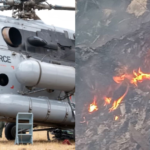
Captain Paul Forjoe, a retired pilot and a senior aviation engineer with the Aircraft Accident and Incident Investigation and Prevention Bureau (AIB), has outlined key safety recommendations following investigations into the fatal Ghana Air Force helicopter crash that claimed eight lives, including two government ministers and senior officials.
Speaking during the official presentation of the findings, Captain Forjoe said the investigative board has urged the Air Force to modernise its fleet and invest in advanced aviation technology to improve safety and prevent similar incidents.
“We have recommended that the Air Force acquire modern aircraft with terrain avoidance warning systems and modern navigation systems,” he said.
“The aircraft should also have cockpit voice recorders and flight data recorders, which are the audio-visual capable types.”
The crash involved a Harbin Z-9EH military helicopter (tail number GHF 631) operated by the Ghana Air Force. The aircraft departed from Accra at about 9:12 a.m. on August 6 en route to Obuasi in the Ashanti Region for an anti-illegal mining operation when it lost radar contact and crashed in the Adansi Akrofuom District.
All eight passengers and crew on board died in the incident. The victims included Dr. Edward Omane Boamah, Minister for Defence; Ibrahim Murtala Muhammed, Minister for Environment, Science and Technology; Muniru Mohammed Limuna, Acting Deputy National Security Coordinator; Samuel Sarpong, NDC Vice-Chair; Samuel Aboagye, former parliamentary candidate; Squadron Leader Peter Bafemi Anala; Flying Officer Manaen Twum Ampadu; and Sergeant Ernest Addo Mensah.
Captain Forjoe said the board also recommended that the Air Force invest in simulators for recurrent pilot training to enhance proficiency and operational safety. He added that Ghana should contract certified aviation weather providers and develop en route navigational aids, especially in remote areas where such systems are lacking.
“The Air Force should seriously consider establishing flight data monitoring and en route tracking systems,” he explained, noting that these would allow better real-time oversight of aircraft operations.
The investigation further urged the modernisation of ground support equipment to strengthen maintenance and emergency response capacity across Air Force bases.
According to Captain Forjoe, these recommendations are crucial for enhancing the Air Force’s operational readiness and preventing future aviation disasters.